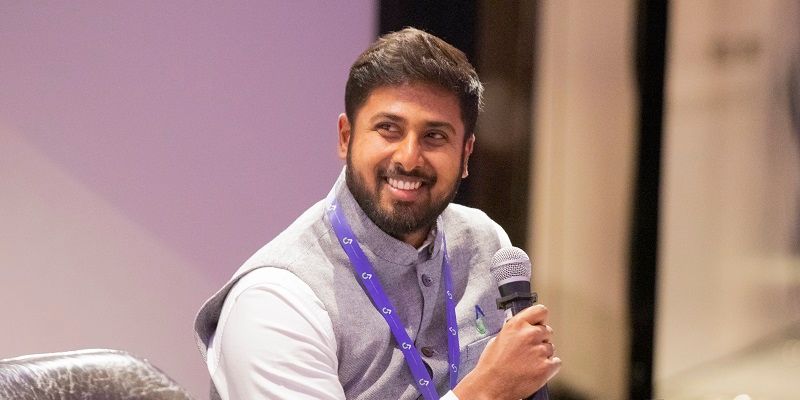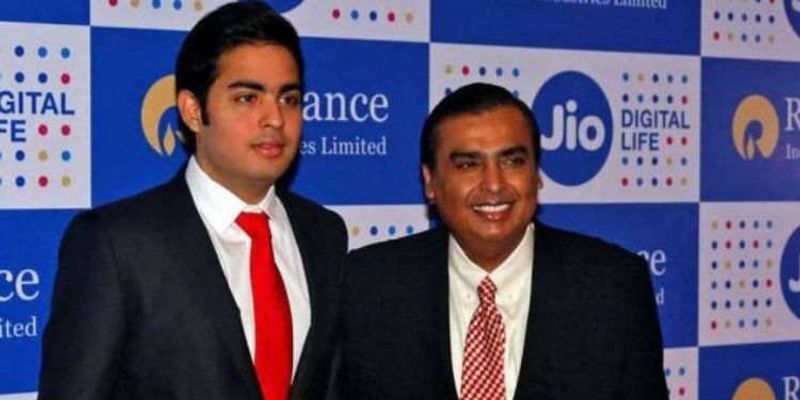Atria University's Kaushik Raju wants to scale the student entrepreneurship model
The third generation entrepreneur from the Atria Group believes that merely graduating from a college is no longer enough. He wants every student to work on a startup with new ideas.
Walking across Hebbal, one would believe that this sprawling north Bengaluru suburb is all concrete, but inside it, there is a large campus, which is filled with green fields and it turns out to be an engineering institution. There is activity abuzz there and it’s not your usual textbooks and lectures. It is unusual because industry and students are working to create solutions. Inside, students are working on a plasma printer imprinting metal over metal and creating alloys that can be used for industrial applications.
One of the lecturers is running to an industrial cluster to get industry problems to the R&D lab at the university.
There, Kaushik Raju, the director of the university and third generation entrepreneur of the family that founded Atria Hospitality and Act Broadband has readied himself to change the way students work with companies.

Atria University Director, Kaushik Raju
“For a long time, students in engineering and streams like BCom and BSc have not worked with industry during their college days. Usually a corporate firm comes over and gives tools to do their project work. But I say that we have to go beyond that. We need to prepare our kids for work right after their Class 12, which means more project work in the real world with SMEs and large corporates. It’s the only way we can solve the unemployability issue and build a journey towards entrepreneurship,” says Kaushik Raju, the Director of Atria University.
Kaushik is also betting on teachers to think like entrepreneurs. Every lecturer at the university must work with a corporate in order to bring a problem statement from the corporate to the university to solve. Kaushik himself is preparing a blue print where the corporate pays the students and the college to come up with solutions.
“At least this is the thought process now. We are experimenting with several things. The future of innovation should come from institutions like ours,” says Kaushik.
Kaushik himself is one of the founders of Intellicar which works on automotive telematics using AI and ML. After being in an entrepreneurial family he believes he has to share his learnings with others.
“When we started ACT Broadband it was meant to be used to deliver educational content to government schools and from there the idea scaled to a business. Similarly, we are working on clean energy ideas as part of the Atria Group,” says Kaushik.
As Kaushik shows the university to YourStory he reveals its new incubation centre, a green building, which houses several cubes for startup innovation. Kaushik reveals this building is for startups, corporates who want to work with startups and for startups incubated by the Atria Innovation Fund. He believes he can fund at least seven startups per year or more and incubate and accelerate them.
The fund for students
Kaushik has now created Business Incubator Centre with a fund whose corpus is undisclosed. But it will fund six to seven ideas every month from innovators across the country. The platform is open only to high school and engineering students. This year it had six hundred applications from which ideas of three students were selected and set up as startups. In a true sense it is an incubator for young ideas. There were three startups selected, Preditech, Blood Insure and SpaceY. Kaushik says each of these young entrepreneurs receives Rs 10 lakh to build the prototype and will receive support from Atria to work on their tech with corporates.
YourStory caught up with these founders and found the ideas to be compelling. Ishita Yadav (17) is a coder who has been coding for five years. In one of the visits to a hospital, she realised that doctors do not have the time to look at report after report and hence can be prone to make mistakes. She enquired with a few doctors whether they would also like an algorithm in order to help them with opinions. The doctors gave her the green signal. She began building the concept and applied to the Atria University after they announced that they were going to incubate good ideas.
“Healthcare needs to work with algorithms. Currently, there can be mistakes while analysing thousands of images and reports. Now my algorithm can reduce the rate of error and increase the efficiency of the healthcare ecosystem in India,” says Ishita Yadav, founder of Preditech who lives in Bengaluru. She credits her coding skills to her mum and dad. Her product will be delivered as a SaaS service for Hospital Management Systems.
SMBs are key to industry. According to FICCI, SMBs are the second highest employers after agriculture and contribute 30 percent to the GDP of the country. However, they have one fundamental problem. They do not know how to monetise their idle capacities. Now creating an algorithm that can predict idle capacity that can be used by the industry is SpaceY.
“Our startup is a multipurpose online platform which aims to connect designers, makers, and the market to enable efficient manufacturing practices in India,” say Ratish Panda and Soham Sen (both 18), founders of SpaceY from Kolkata.
This startup was conceived when they went to SME clusters in Kolkata where they realised that a customer who had placed orders for small auto parts could not find or add the capacity in time. Upon quick research they realised that additional capacity was available in other plants in the same business. They realised that if they created a platform that can connect businesses to know each other’s capacities which can be shared then the economy would grow faster because of capacity utilisation. This startup will be working on an aggregator model with SMBs and charge a transaction fee.
The third startup that Atria University funded is Shivank Joshi’s Blood Insure.
This startup aims to set up a donate blood-from-home service through an app to ensure India’s blood banks have adequate and timely supply amidst the pandemic. The startup will work with insurance companies to reduce the insurance premium for anyone who donates blood. “Everyday, you read about blood shortage for the needy. There needs to be incentives first and also mapping of how to get blood for the needy,” says Shivank, founder of Blood Insure.
Before homing in on these three startups, Atria University received applications from startups from places like Bhilai, Bengaluru, Chennai, Delhi, Jaipur, Kolkata, Mumbai, Nagpur, and Pune. Many of the ideas were directed to solve a challenge in five emerging disciplines - Digital Transformation, Energy Sciences, Interactive Technologies, Mobility, and Sustainable Life Sciences. “These should be the subjects that engineers should major in and we have created this fund to support many ideas,” says Kaushik.
“We want to create future leaders who can address the most complex problems faced by the global industry today. We want to encourage students to think differently and empower them to transform the world that they see around them. It has been a humbling experience to receive world-class ideas,” says Shaheem Rahiman, CEO of Atria University.
On funding ideas, Kaushik has an entire incubator centre planned for corporates to work with startups founded by student entrepreneurs.
According to , India has 35 million students in universities and with 12 million students graduating every year, India needs to have 120 million of them placed and employed.
“Universities and corporates have to work together on the innovation model. Only entrepreneurs can provide employment and we want to back many of them with our fund and ensure these students set up successful companies and not just graduate with a degree,” says Kaushik.
Meanwhile, at the plasma printing lab, several SMEs from the electronic cluster at Peenya and the Indian Institute of Science are sending in their research teams to work with students to come up with solutions. They were imprinting brass on steel and the students were trying to figure out how this can be an industrial application.
Edited by Javed Gaihlot












